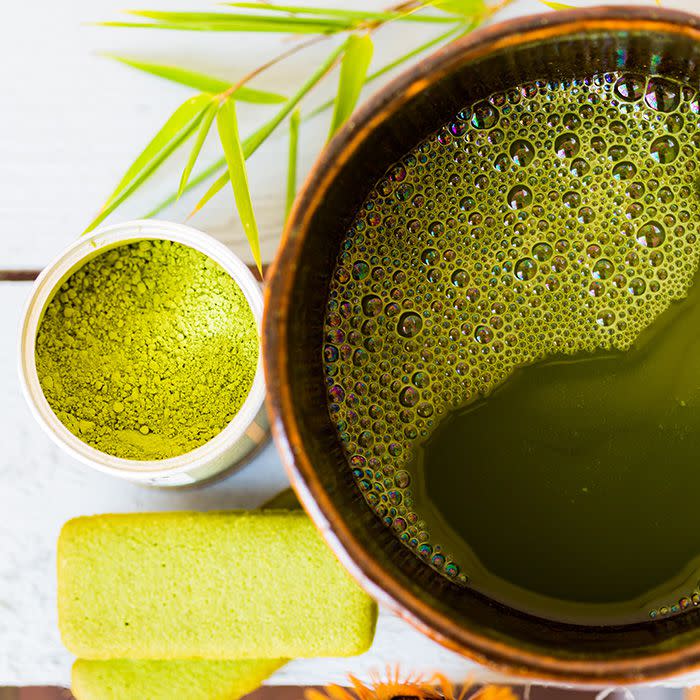Can Too Much Green Tea Lead to Liver Damage?
There are a lot of benefits of green tea, but too much highly-concentrated tea or supplements could cause herbal hepatotoxicity, or liver damage.

Despite all the health perks that come with a cup of green tea or matcha, too much of a good thing can actually make some people sick. Specifically, if you're ingesting a lot of the highly concentrated form (which can be found in weight-loss teas or on its own as a supplementary green tea extract) liver damage can occur as a result.
It's called hepatotoxicity, and it happens when too many herbs or supplements — everything from ibuprofen to green tea extract — chemically induce liver damage. This particular type, herbal hepatotoxicity, can happen when you take too much of an herbal supplement or even down too many cups of highly concentrated herbal drinks a day.
So what's the offending ingredient in this normally healthy beverage? Green tea is packed with catechins, an antioxidant compound that in the proper dose delivers big benefits such as lower cholesterol and reduced risk of heart disease and cancer. But taken in highly concentrated doses (as in, those found in a lot of weight-loss supplements and teas), it can cause herbal hepatotoxicity.
:15 Incredibly Delicious Foods That Lower Cholesterol
"When you start taking the extracts and boiling them down into concentrated capsules, it's kind of like little tiny bombs going into your liver," says Niket Sonpal, M.D., a New York–based internist and gastroenterologist. These super-concentrated doses cause the cells of your liver to become overwhelmed and start breaking down. This can cause physical symptoms such as fatigue, severe abdominal pain, and jaundice.
Figuring out how much is too much, though, isn't an exact science, says Christopher Hobbs, Ph.D., an herbalist who specializes in holistic health. "Many of the cases of hepatotoxicity from even purified and highly concentrated foods and herbs act in an idiosyncratic way. That means that they will affect one person as a liver toxin, while many others are not at all affected," he says.
"The body deals with and utilizes these compounds in very different ways. How your liver will transform and eliminate or utilize many natural compounds is determined by genetics, but also what else you are eating and drinking," explains Hobbs.
:What Are Drinkable Greens and Are They As Healthy As the Real Thing?
Does this mean you have to worry every time you have a cup of tea? Honestly, not really. "Green tea is incredibly safe for the most part," notes Dr. Sonpal. "It's rare for hepatotoxicity to occur with daily normal consumption. It's when you start taking highly concentrated doses that we run into problems," he explains.
The National Library of Medicine backs this up, noting that it's incredibly rare for someone to suffer liver damage from drinking plain old green tea. The problem is more often seen as a result of the use of those aforementioned supplements that are stuffed with highly concentrated green tea extract. Liver damage shouldn't be at the top of your mind if you want to enjoy a daily cuppa.
If you're downing herbal tea like it's water, though, consider having a conversation with your physician and letting them know the types and brands of tea you're drinking to make sure you're safe, recommends Dr. Sonpal. Or, if you've started drinking lots of matcha, it might not be a bad idea to check in with your doc since it's a concentrated form of green tea. "They can help you understand how much of a good thing is too much," notes Dr. Sonpal.
:Matcha Benefits That'll Have You Rethinking Your Daily Coffee
As for supplements, you should always play it on the safe side, as even natural ingredients can carry some serious side effects. "Before you take supplements, you should speak to your physician about it," advises Dr. Sonpal. "You may have an underlying condition that can be exacerbated," he notes.
Bottom line: Pay attention to what you're putting into your body. Just because it's natural, doesn't mean more is better.

